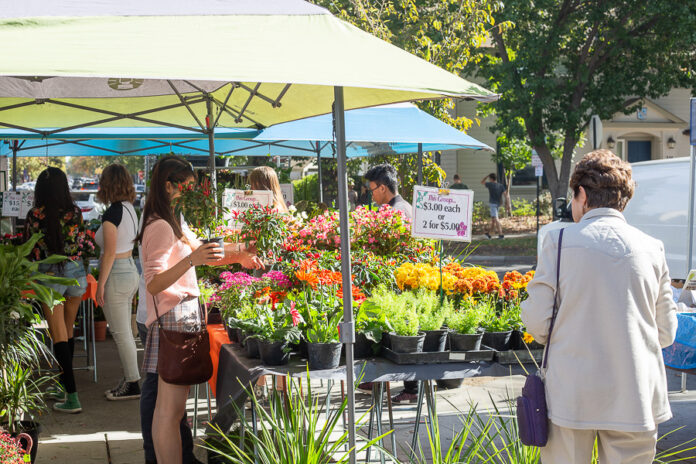Davis community members, students come to plant sales to buy California native plants
Agaves, aloes, succulents, California Fusil, Buckwheat, California Lilac, Manzanitas, Salvias — all can be found at the Arboretum and Public Garden Plant Sales.
Community members and students attend these events at the Arboretum Teaching Nursery, on Garrod Drive, to purchase plants grown and sold as a fundraiser for the Arboretum and Public Garden. With three in the fall and four in the spring, anywhere between 1,000-1,500+ customers will attend the events. These sales are put on by the Arboretum and Public Garden staff, volunteers and Learning by Leading students, according to UC Davis Arboretum and Public Garden Assistant Director Carmia Feldman.
“We put on the sales because they are our biggest outreach and community engagement opportunities of the year to educate people on regionally appropriate gardening and [to] sell the California natives, Arboretum All-Stars and other plants that will help them be successful in creating gardens that need less water, less fertilizers and pesticides and provide [a] habitat to important native pollinators and other wildlife,” Feldman said.
According to Nursery Manager for the Arboretum and Public Garden Taylor Lewis, the sales are well trafficked because the plants sold at the events cannot usually be found at retail stores. People line up beginning at 7:30 a.m. and anywhere from 200-300 walk in the door right away.
At the sales, over 600 taxa or plant varieties are available for purchase, such as various kinds of trees, vines, bulbs and grasses. According to Lewis, the sales offer plants for all soil and sun types.
“I focus specifically on drought tolerant, pollinator, beneficial insect attracting plants from the mediterranean climates of the world,” Lewis said. “California natives make up 30-35% of my overall stock. I grow plants that are hardy in our area, since I don’t like to grow plant that don’t do well here.”
The price of the plants depends on how easy they are to grow. Plants that take years to be ready for retail cost more, according to Lewis. Most common, one-gallon plants are sold for $12.
According to Feldman, the plant sales are the biggest fundraising events of the year for the Arboretum and Public Garden, with all proceeds going directly toward supporting the educational and environmental stewardship programs.
“It is a fundraiser to support a lot of the programs for the public,” said Outreach and Leadership Program Manager Melissa Cruz Hernandez. “A lot of the educational programing that we do is for free. We raise funds to support our organization.”
These events attract many members from the community, such as homeowners, landscape and garden professionals, restoration professionals, campus affiliates and more.
“We have many outreach partners at the sales and often have children’s activities, live music [from local musicians], and educational demonstrations,” Feldman said.
Professionals and expert graduate students are brought into the sales to get advice about the best types of plants for specific yards with different soils or amounts of shade.
“We plan the events in a way that is fun and engaging for the community and also makes people want to come again,” Cruz Hernandez said.
Community volunteers and students make up most of the workforce that puts on the plant sales. According to Lewis, there is a very small number of paid staff that work for the nurseries. Four volunteer teams work every week to grow and take care of the plants.
“Volunteer work is a crucial piece of what we do,” Lewis said. “Students who are interested in how to grow plants and manage a nursery have a team of them who are here every week.”
Students who want to get involved with the plant sales and the public garden can take part in any of the 12 relevant internships offered. In the Nursery and Propagation Internship, students learn how to propagate the plants that are sold at the sales.
“Not only are the [plant sale] days really fun and engaging, the behind the scenes that allow the sales to happen is also very engaging in that we have community volunteers and students working side by side, making sure we have those plants readily available,” Cruz Hernandez said.
The Fall 2019 plant sale dates are Sept. 28, Oct. 12 and Nov. 2, all from 9 a.m. to 1 p.m.
“We invite everyone to get involved in the plant sales,” Feldman said.
Written by: Margo Rosenbaum — features@theaggie.org




